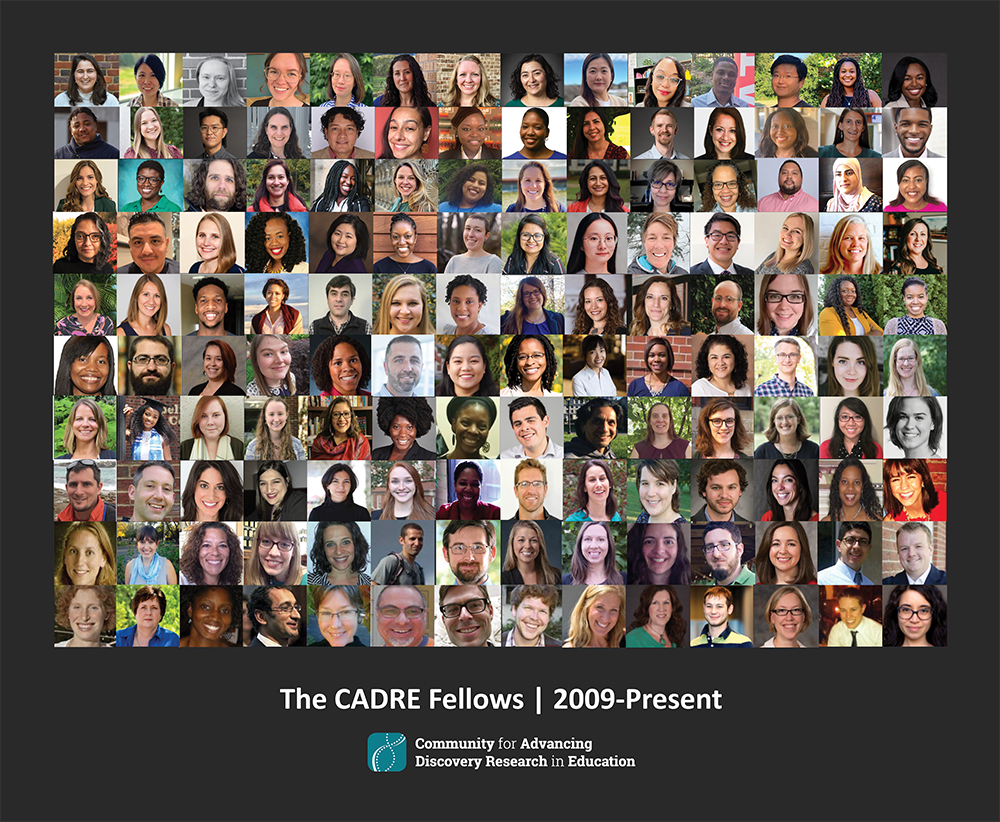 The CADRE Fellows program provides professional growth opportunities for early career professionals in the field of preK-12 STEM education research. Through a series of capacity-building activities, the program offers Fellows the opportunity to gain insight into what it takes to be successful and effective in this field, become more familiar with National Science Foundation (NSF) practices, network with experienced researchers, and build community with other early career researchers from across the country.
The CADRE Fellows program provides professional growth opportunities for early career professionals in the field of preK-12 STEM education research. Through a series of capacity-building activities, the program offers Fellows the opportunity to gain insight into what it takes to be successful and effective in this field, become more familiar with National Science Foundation (NSF) practices, network with experienced researchers, and build community with other early career researchers from across the country.
As part of the program, CADRE Fellows:
- Attend a virtual program orientation;
- Participate in discussions with DRK-12 awardees and other STEM education researchers during a series of interactive, topical webinars;
- Collaborate and offer peer support on activities designed to meet the needs of early career researchers;
- Meet NSF program officers, learn about the NSF proposal review process, and participate in a mock review led by an NSF program director; and
- Advance a career-development project specific to their interests.
Program activities focus on: career pathways, research use and dissemination, community building, and research funding. The Fellows program typically runs from January-July. See the 2025 Calendar of Activities.
Program Impacts
As of summer 2025, 172 early career researchers have participated in the CADRE Fellows program. They have reported many benefits from participating in the program, such as:
- A better understanding of NSF funding mechanisms and the proposal review process;
- Professional contact with other STEM education researchers;
- Awareness of different career opportunities in STEM education, particularly opportunities at non-academic institutions;
- Increased confidence in participating in professional conversations;
- Increased knowledge related to writing and publishing; and,
- A better perspective of what it means to be a STEM education professional.
Fellows continually report that one of the primary benefits of the program (in addition to learning about research funding and the NSF context) is the opportunity to engage and build community with peers from other institutions. In our evaluation of the program, Fellows have reported that they collaborate or communicate with other Fellows after program completion. This suggests that the CADRE Fellows program is establishing a sustainable network of alumni in the field of STEM education research.
Fellows from previous years found the program to be a significant professional development experience. As noted by Fellows in the past:
“Being a CADRE Fellow has bolstered my confidence in general and in my ability to be a funded STEM Ed researcher. I met so many helpful PIs who pointed me toward colleagues of theirs at the university where I accepted a faculty position.”
"The opportunity to visit NSF and participate in a mock proposal review was a unique aspect of this professional development program. Being able to meet directly with program directors to learn about the grant writing and review process was invaluable."
"I met some amazing individuals I am still in touch with today. We chat via phone, send text messages, or check in through Facebook—individuals I would not have met if it wasn’t for the CADRE program. I learned from their experiences as early STEM career researchers."
“The whole experience definitely has helped and will continue to help me in building my career as a researcher and educator. I am very impressed by the experiences we were given and the connections with professionals in the field that were made available to us.”
CADRE Fellows Network
CADRE Fellows have represented academic and non-academic institutions across the country.